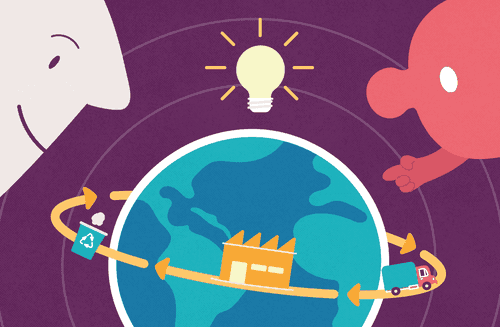
29/04/2022
Reverse Logistics as an ally of Circular Economy
If you follow the contents of the Circular Movement, you should already know that the basic concept of Circular Economy is that every resource can and should be reused and transformed, until nothing else becomes waste. But how do you do that? This is based on new individual and collective behavior, and on the adoption of processes such as the reuse, recycling and remanufacturing of products. For this to happen, one of the fundamental mechanisms is reverse logistics.
What is reverse logistics?
Reverse logistics is the flow through which products, packaging and other solid waste leave the final consumer's hands and return to their place of origin: industry. In other words, it goes from collection to the return of the waste to the business sector. In doing so, it is possible to carry out the remanufacturing the products, proposed by the circular economy.
For the production of consumer goods to take place in a cyclical manner, we need to stop only extracting and exploiting the resources of nature to produce goods that will be discarded and start to take more advantage of the resources that are already in use, making them start a new cycle.
Who makes reverse logistics happen?
This is not a process that is in the hands of just a single agent, such as a company, cooperative or NGO, but it needs to be able to count on the participation of all sectors involved in the production, consumption and management of waste. Consumers need to dispose of waste from the products they use in the right place; traders should facilitate access to a suitable place for returning the goods; industries should collect discarded waste to re-use it or remanufacture it into new products; and the public authorities should help in raising awareness, in monitoring each stage and in creating public policies that encourage the adoption of these practices
National Solid Waste Policy
More than a suggestion or alternative, reverse logistics is the instrument provided for in the National Policy on Solid Waste (PNRS in the Portuguese acronym), instituted in Brazil by Law No. 12,305 of 2010, created to organize the way in which the country handles waste and to demand, from the public and private sectors, transparency in the management of its waste.
It even establishes that this planning should rely on the articulation between the different spheres of the public authorities, and of latter with the business sector, with a focus on cooperation, to meet the objectives of the Policy.
What is the Circular Economy?
The Circular Economy proposes a new look at our way of producing, consuming and discarding, in order to optimize the planet's resources and generate less and less waste. In other words, an alternative model to the Linear Economy - extract, produce, use and discard - which has increasingly proven to be unsustainable throughout history. In the Circular Economy, the goal is to keep materials in circulation for longer periods through reuse, until nothing becomes waste! For this model to become a reality, we all have a role to play. It is a true collaborative circle, which feeds itself, and helps to regenerate the planet and our relationships.
Learn about Circular Economy
If you are interested in learning more about this topic, visit Circular Academy, the first free Latin American course on circular economy aimed at general audiences. All of us, in partnership and collaboration, can make a difference in building a more circular planet.
About Circular Movement
Created in 2020, amid the crisis caused by the Covid-19 pandemic, Circular Movement is a collaborative ecosystem that strives to encourage the transition from linear to circular economy. The idea that every resource can be reused and transformed is the motto of circular economy, the movement’s basic concept. Circular Movement is an open initiative that promotes collaborative spaces with a mission to reach more people and places. The movement’s purpose is to inform people and institutions that a future without waste is possible through education and culture, the adoption of new behaviors and the development of new processes, products and attitudes.

